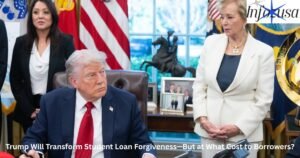
As Trump will transform student loan forgiveness, a growing number of advocates and borrowers are raising alarms. A new plan introduced by the Trump administration threatens to reshape forgiveness policy into a politically driven system, potentially denying relief to entire groups of borrowers based on their employers’ social or political work.
This article walks you through:
-
What Trump’s changes mean
-
Who is most at risk
-
How to protect your PSLF status
-
Why advocates fear political retaliation
Let’s break it down.
Student Loan Cancellation Program Could Become Trump Retribution Tool, Some Advocates Fear
When President Donald Trump signed a new executive order in March 2025, it kicked off a drastic reimagining of the student loan cancellation program for public service workers.
Under this proposal, the Department of Education (ED) would gain authority to disqualify any employer from PSLF eligibility if the Secretary determines the organization has engaged in “illegal activities.”
The problem? The draft defines “illegal activities” in politically charged terms:
-
Supporting undocumented immigrants
-
Offering gender-affirming care to transgender youth
-
Advocating for Palestinian rights or opposing certain federal policies
-
Supporting causes that the administration associates with terrorism
Critics warn that this student loan cancellation program could become a Trump retribution tool, weaponized to silence political opponents.
“That’s definitely an indicator for me that this is politically motivated and perhaps will be used as a tool for political punishment,”
— Betsy Mayotte, President of The Institute of Student Loan Advisors (TISLA)
How the Public Service Loan Forgiveness (PSLF) Program Works
The PSLF program was introduced in 2007 under President George W. Bush with bipartisan support. Its mission was simple:
Encourage graduates to pursue public service by offering full student loan forgiveness after 10 years of qualifying payments.
To qualify, borrowers must:
-
Work full-time for a government agency or eligible nonprofit
-
Make 120 qualifying payments
-
Be enrolled in an income-driven repayment (IDR) plan
Since President Biden’s reforms, more than 1 million borrowers have had loans forgiven through PSLF. For many, it’s been a life-changing benefit.
But under Trump’s plan, this promise of forgiveness could be pulled—based not on the borrower’s actions, but on the politics of their employer.
Real-World Consequences: Tracey Blake’s Story
Tracey Blake, a researcher from Maryland, and her husband owe $240,000 in federal student loans. With only two years left before her debt is forgiven through PSLF, she now faces deep uncertainty.
“I am terrified that the rug is going to be pulled out from under me,”
— Tracey said during a public comment session
If her nonprofit employer loses PSLF eligibility due to providing services deemed politically sensitive, her years of repayment could be rendered useless.
Student Loan Forgiveness Becoming Politically Selective?
The executive order authorizes the Education Secretary to make unilateral decisions on which employers should be banned from PSLF. These decisions:
-
Do not require legal convictions or court rulings
-
Can be based on broad accusations of illegal conduct
-
May impact entire organizations or hospital systems
As Newsweek reports, even an entire city could be affected if it limits cooperation with federal immigration enforcement.
This fuels fears that Trump will transform student loan forgiveness into a mechanism for targeting liberal cities, universities, nonprofits, and civil rights organizations.
“This unfortunately may allow them to further chase the undesirable institutions, in their view,”
— Alyssa Dobson, Slippery Rock University
Technical Failures and Staff Layoffs Add to Chaos
Even before the policy shift, PSLF tracking systems were breaking down:
-
The Education Department paused payment tracking for PSLF and IDR due to technical failures
-
Borrowers couldn’t verify qualifying payments
-
Backlogs piled up, made worse by staff layoffs and internal disorganization
“Borrowers were left in the dark about their progress… and the system is under stress.”
— Kevin Thompson, CEO of 9i Capital Group
Step-by-Step: How to Protect Yourself From PSLF Changes
If you’re a PSLF borrower or plan to be, here’s how to protect your status:
✅ Step 1: Check Your Employer’s Eligibility
Use the official PSLF Employer Search Tool to confirm your organization still qualifies.
✅ Step 2: Submit an Employment Certification Form (ECF) Annually
This form confirms your job is eligible and tracks your progress.
✅ Step 3: Monitor Rulemaking
Sign up for updates from StudentAid.gov and submit public comments when new proposals open.
✅ Step 4: Talk to Your Employer
Ask HR how they’re ensuring compliance and preparing for possible audits.
✅ Step 5: Prepare Backup Plans
Look into Income-Driven Repayment Forgiveness as an alternative.
Why Student Loan Advisors Are More Valuable Than Ever
With the PSLF program in flux, services like:
…can help you:
-
Confirm eligibility
-
Avoid mistakes
-
Track payment progress
-
Submit appeals
Spending a little now could save tens of thousands in forgiven debt later.
💬 What Advocates Are Saying
Leading student loan advocates are urging restraint and transparency.
“We urge the Department to reverse course and ensure that PSLF eligibility is never subject to a political judgment by the Executive Branch alone.”
— The Institute for College Access & Success (TICAS)
“Since 2007, PSLF has been one of the most powerful tools to reduce student debt while helping underserved communities.”
— Alex Beene, University of Tennessee
The consensus? PSLF should be protected from political interference, not turned into a tool for retribution.
✅ Conclusion: Forgiveness Shouldn’t Be a Political Game
There’s no question that Trump will transform student loan forgiveness in a big way—and potentially not for the better.
The concern that the student loan cancellation program could become a Trump retribution tool isn’t just speculation. It’s a real, growing fear voiced by borrowers, advocates, and higher education leaders.
If you’re part of the public service workforce, your forgiveness shouldn’t depend on politics—it should depend on your service and commitment.